Menu
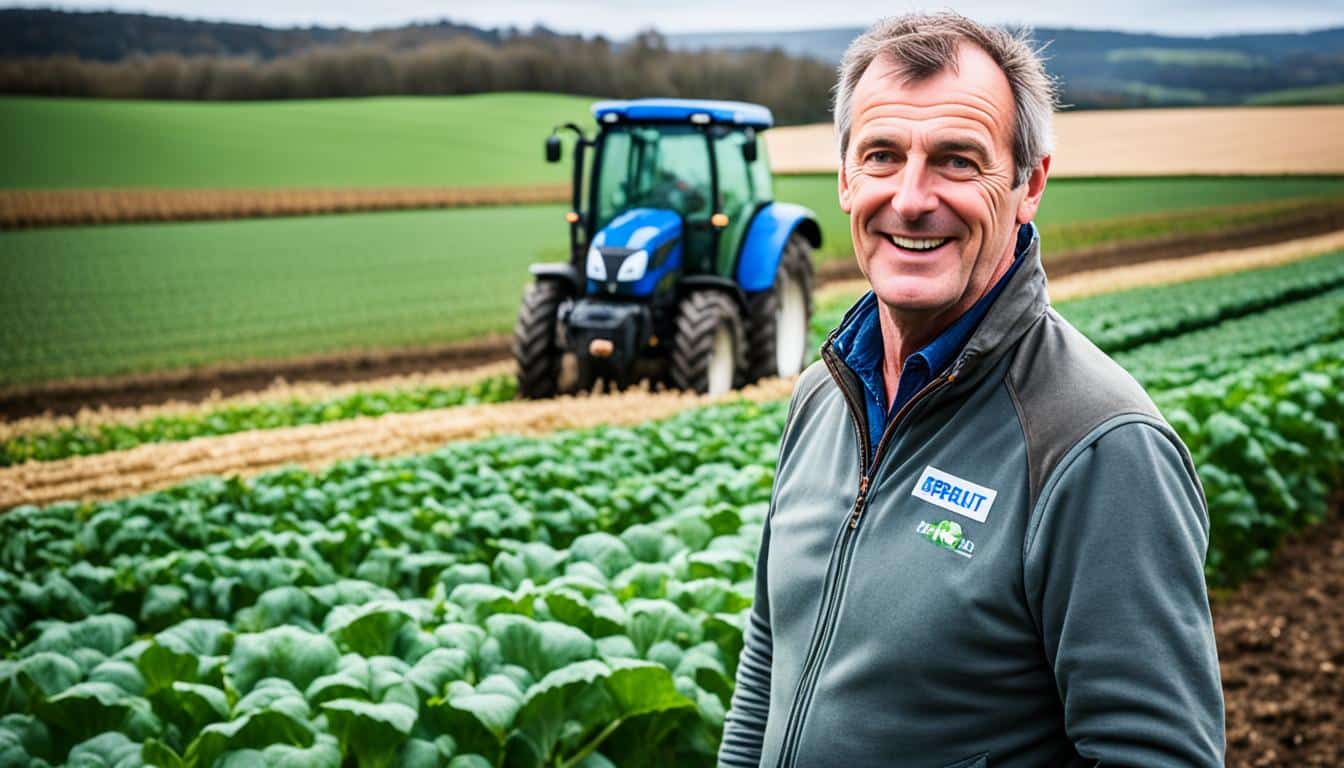
Over 6,300 farms in the UK have closed since 2017. This shows the urgent need for strong help in farming. Recently, Prime Minister Rishi Sunak brought out a big support plan at the Farm to Fork Summit. These plans will help farming after Brexit by boosting homegrown food, new tech, and training future farm leaders.
There’s a big connection between having enough food and keeping the nation safe. So, the UK aims to grow more fruits and vegetables while using less energy and water. There will also be more money put into farming. Changes are being made to planning laws to speed this up. The UK Food Security Index will watch how safe our food is over time. And, £75 million is set to help farmers hit by heavy storms get back on their feet.
Watch this space for more on these important changes coming to UK farming. These initiatives are set to make a big difference.
The Farm to Fork Summit was a big deal. Prime Minister Rishi Sunak unveiled new support for British farming after Brexit. These schemes are vital for adapting to change and keeping farms strong.
The summit highlighted the need for better food security and farming methods. Talks covered the new farming rules and subsidies after Brexit. These are meant to help farmers move towards more eco-friendly and efficient ways of farming. The goal is to match the current farm finance with future farming needs.
The support package has several important aims:
For instance, there are big payments for helping wildlife and nature. Farmers get £765 per hectare to help birds like lapwings find homes. They also get £1,242 per hectare to improve rivers and flood areas. About 8,000 farmers have joined the Sustainable Farming Incentive for 2023. An impressive 94% more farmers are now part of the Countryside Stewardship scheme since 2020. This shows a big interest in these support plans.
A key part of the support is a new Food Security Index. It tracks how safe our food supply is against issues like politics and the climate. Over £168 million is going to farmers for new ideas and help in 2023. This will make the UK stronger in producing food.
The government is also investing £45 million in smart farming tech. This includes robot and automatic farm gear, as well as money for research. These steps show a plan to keep the UK ahead in farm innovation after Brexit.
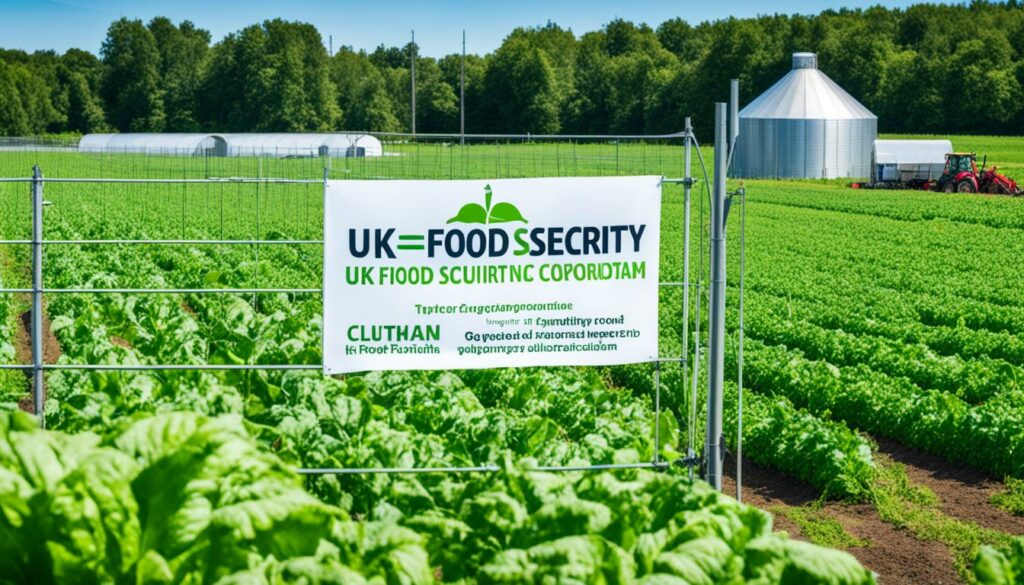
Ensuring there’s enough food in the UK is getting harder. The UK Food Security Index aims to tackle these issues. It checks risks from global crises and climate change on our food supply.
The UK Food Security Index is a key new tool. It looks at the whole food chain to spot any weak points. By considering things like politics and weather, it helps make farming policies smarter.
The government wants to make the UK less dependent on food from abroad. They plan to boost farm production and manage land better. They’re also helping farmers be more efficient and supporting new farming methods.
The war in Ukraine and bad weather have caused big problems. Less grain from Ukraine and damaged crops hit our food supply. This led the government to invest £75 million to help flood defenses and keep farming strong.
The NFU’s data shows farmers are really worried. Many fear losing money or even their farms. Making the right changes in farming policy is very important to save our food future.
| Aspect | Domestic Production |
|---|---|
| Overall Food | 60% |
| Fruit | 17% |
| Vegetables | 55% |
The government is working hard to fix these food challenges. They want a more secure and green future for farming in the UK.
The Prime Minister has pledged £220 million for new technologies in farming. The aim is to help farmers by investing in new methods and machines. This money is specifically for making farming more efficient and productive.
A big part of this fund will go towards robots and automated tools. For example, there’s a focus on using robots to weed fields instead of people. This investment will help change how farms work, making them need less manual work and run more smoothly.
There’s also a plan to double the money available to horticulture businesses. They will receive support for their growth and innovation projects. With a particular focus on orchards, £10 million will ensure apple farms can be more productive and sustainable.
It’s crucial to keep innovating in how we farm. The government is supporting new farming methods to tackle today’s challenges and seize new opportunities. This includes things like smarter harvests and more precise farming. The goal is to make the agriculture industry stronger after Brexit, through innovative and greener practices.
After Brexit, there’s a big push to help the farming sector by encouraging new farmers. The aim is to find and support the next leaders in farming. This helps make sure the farming industry keeps moving forward.
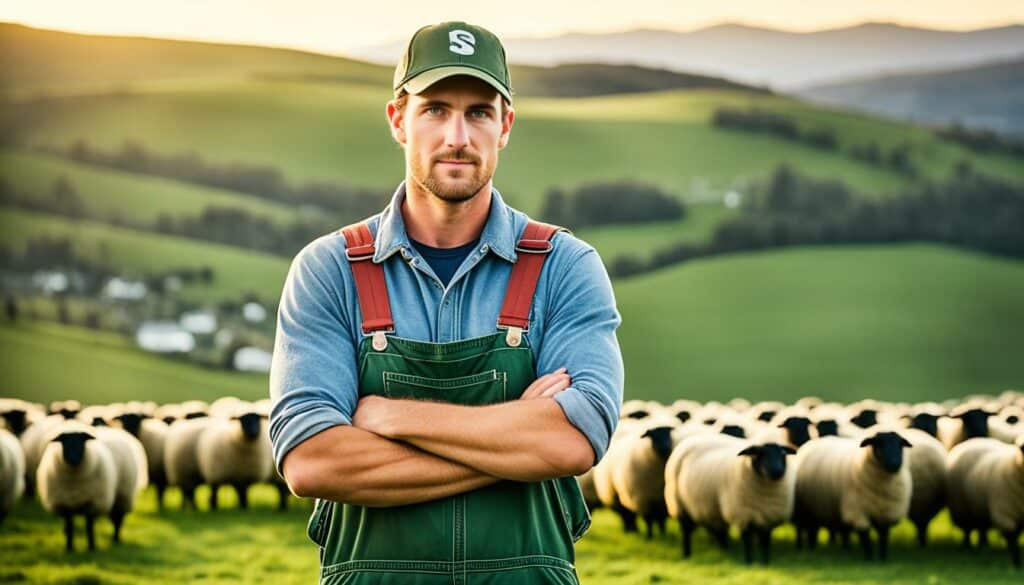
The government is putting extra effort into getting young people interested in farming. They want to make sure there’s a steady flow of new leaders. This way, there will always be fresh talent guiding the future of farming.
Specialised educational programs are being developed for young farmers. These teach the latest farming methods and how to run a successful farm business. By mixing both theory and practice, the government is shaping well-prepared future farmers.
Lots of money is also being put into top-notch training centres. The goal is to arm young farmers with the latest skills and knowledge. They’ll also get helpful advice and support from experienced farmers, thanks to mentorship and networking programs.
| Element | Details |
|---|---|
| Increased Agroforestry Actions | 50 new actions available |
| Application Increase | Approximately 8,000 farmers in Sustainable Farming Incentive 2023 |
| Countryside Stewardship | 94% increase in agreements since 2020 |
| Funding for Young Farmers | At least 3% of direct payments budget |
After Brexit, the UK is changing its farming laws to make things work better. They’re focused on making rules simpler for farmers. This means they won’t be slowed down by too much paperwork, especially when building glasshouses.
These changes have made a big difference. Getting help like the Sustainable Farming Incentive is now easier. It means farmers can follow the rules without trouble, no matter how big or where their farms are.
One big change is making it easier to build glasshouses. Before, rules often stopped farmers from building on time. Now, with simpler rules, farmers can build faster. This helps them grow more crops and be more sustainable.
Making it easier to get approvals is also part of the plan. The goal is to help farmers face fewer problems. By 2024, many more farmers should be part of environmental schemes. This will be a big increase.
| Scheme | Increase in Participation |
|---|---|
| Sustainable Farming Incentive | 8,000 farmers (2023) |
| Countryside Stewardship | 94% since 2020 |
There’s a lot of money being spent on new and better farm equipment. For example, there’s a £45 million fund for machines that work on their own. This has led to fewer complaints about rules and more approvals for farm improvements.
By making rules easier, the UK hopes to farm better and in a friendlier way for the planet. This will help farmers make more money in the long run.
The government is helping farmers hit by bad weather in a big way, expanding the *Farming Recovery Fund*. They are providing financial help and fixes for needed structures. This aims to support those in trouble because of the bad weather.
The government is offering help from £500 to £25,000 through the *Farming Recovery Fund*. This decision was made because of the very bad weather in 2023. It was the UK’s sixth wettest year since 1836, causing a lot of damage. Places like Gloucestershire, Somerset, and Warwickshire were hit badly. This fund is key for the overall plan to help rebuild after the floods.
Other help like the Sustainable Farming Incentive (SFI) and the *Countryside Stewardship* scheme is also available. They offer help for farmers to get back on their feet and be stronger for the future.
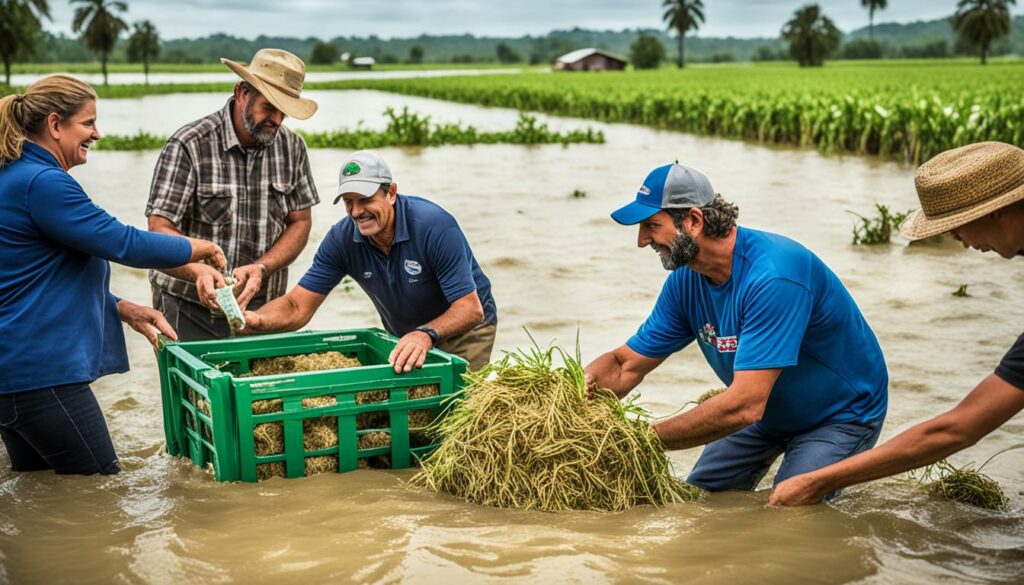
To further support, the government has set aside £75 million for Internal Drainage Boards (IDBs). This money is to improve water management and reduce flooding. It will help make sure farming lands are safer from future floods. IDBs help a lot in making farms more productive and secure.
There are also aids like the *Water Management Grant* and the *Water Restoration Fund (WRF)*. These provide help for important water management and restoration projects. Starting from July 2024, the *WRF* will give money from £75,000 to £2 million for big water restoration works. This shows the government’s strong dedication to supporting farmers and sustainable farming.
The UK is changing its farming support after Brexit. It’s moving from the EU Basic Payment Scheme to new subsidies. These new subsidies aim to back up farmers who do farming in ways that don’t harm the planet but are still very productive.
Farmers will get money for farming sustainably now. The value of these agreements has gone up by 10%. This is under the Sustainable Farming Incentive and Countryside Stewardship. They have added 50 new ways to get help, which can suit many kinds of farms.
| Action | Subsidy per Hectare |
|---|---|
| Nesting plots for lapwing | £765 |
| Connecting river and floodplain habitat | £1,242 |
Already, 8,000 farmers are looking to join the Sustainable Farming Incentive for 2023. This shows a big interest in green subsidies. Since 2020, more farms have joined the Countryside Stewardship, which is also promising good results.
They are also giving out lots of money to try new things in farming. They handed out over £168 million last year for better food and animal care. In November, they gave £45 million more to buy high-tech farming gear. This shows they want to keep farming in the UK modern and innovative.
Yet, farmers haven’t been signing up for these new subsidies as fast as expected, leaving much of the budget unused. To make things better, some are calling for all farmers to get a steady income through a universal scheme. These farmers believe this would help farming be more environmentally friendly.
There are still fears for the future of farming. Many farmers worry about new trade rules and costs. But, the new support is a light in the dark. It focuses on making farming prosperous without hurting the environment. It aims to protect the UK’s farming and make the country more independent in producing food.
The Brexit farming support programs are carefully crafted to tackle challenges and seize opportunities after Brexit. They focus on what farmers need, ensuring the agriculture industry gets strong support. This support aims to help farms grow and stay strong.
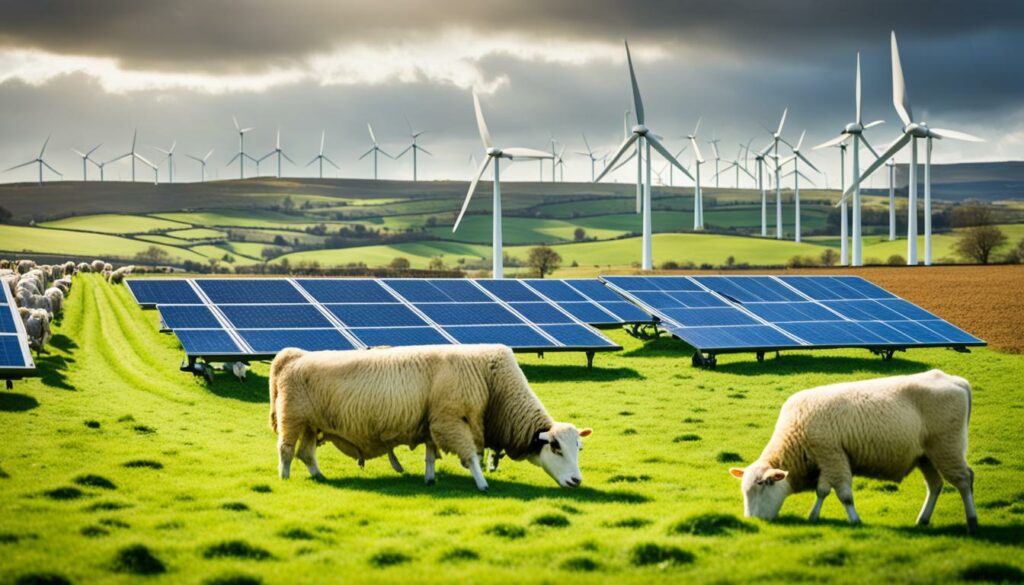
One focus of these Brexit farming support programs is new technology. They encourage farmers to use the latest tech to boost their work and protect the planet. The goal is to make farming more efficient and to cut down on red tape. This means farmers can spend more time doing what they love.
These programs also boost the countryside economy. They help make rural areas better for business and life. By improving the area, it helps the whole country. It helps the country be more independent in making its own food, which is key for keeping everyone well-fed.
Changing the Basic Payment Scheme is a big move too. Now, farms get support that fits their specific needs better. This change helps them deal with the new way things work after Brexit. It’s part of making trade with the EU and other places smoother, like using the UK Economic Operator Registration and Identification (EORI) number for trading.
To show how trade has been changing post-Brexit, here are some key numbers:
| Statistic | Detail |
|---|---|
| UK Agricultural Imports (2022) | $92.1 billion |
| UK Agricultural Exports (2022) | $34.8 billion |
| US Agricultural Exports to the UK (2022) | $3.01 billion |
| UK’s Share of Global Wood Pellet Imports (2022) | 46% |
| US Share of UK’s Wood Pellet Imports (2022) | 64% |
This table tells us about how trade has been going since Brexit. For example, the UK has been buying more from China and Brazil. Their sales to the UK have gone up by more than $1 billion each.
In the end, the Brexit farming support is doing a lot. It deals with industry problems, pushes for new tech, and helps rural areas grow. This strategy is making UK farming sustainable, smart, and tightly connected to the economy.
Crop varieties need to face up to climate change and other tough challenges. The UK is putting more effort into making crops that are tough. They’ve made new rules to help new crop types without getting stuck in red tape.
In a big step, England now supports high-tech ways to breed better crops. With this law, they aim to make crops that can survive harsh conditions and are good to eat. This law also means we can make crop improvements much faster than before.
Breeding crops with precision prevents 40% of loss caused by pests and extreme weather.
Money is going towards making crops better, including ones like the Maris Piper potato. This potato variety fights off a common disease, saving UK farmers lots of money. There are also aubergines, tomatoes, and potatoes that insects and viruses can’t easily harm.
In Cambridge, they’re working on barley that grabs more nutrients from the soil. Besides, worldwide teams are sharing their efforts, like in Brazil with a drought-resistant wheat. It’s made using a sunflower gene. All these efforts are cutting down on the need for harmful chemicals in farming.
This route makes our agriculture strong for the future. It also keeps our food supply safe from the dangers of a changing world.
Brexit has brought big hurdles for farmers and small food businesses in the UK. They supply local makers and shops. A new plan looks to make things better. It wants to bring fairness in agriculture supply chains and ensure transparent supply chain regulations. This way, everyone gets a fair deal.
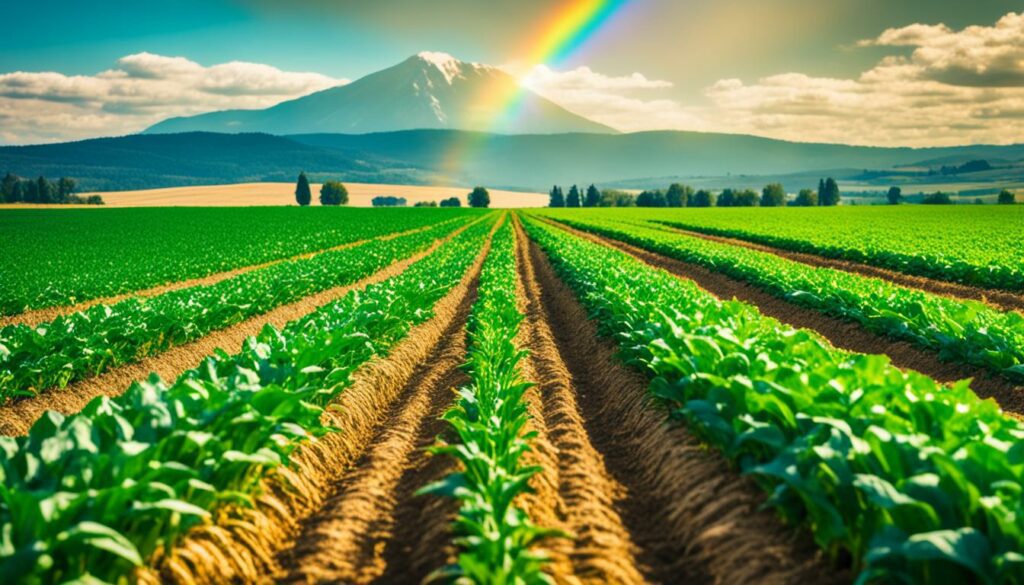
New rules are here to fix the unfair balance in supply chains. They focus on deals in fresh food and eggs. These changes make sure smaller sellers don’t lose out to big shops. In the UK, just nine big supermarkets control over 90% of the food market. But, farmers only get a tiny share. These rules are important to support the farming world.
A special supply chain adjudication officer has been picked. Their job is key. They will watch over and make sure everyone follows the fair deal rules. This means every business must play fair and clear.
“The fair dealing clause in the Agriculture Act 2020, thanks to Sustain, wants all sectors to follow a new Code of Practice,” Sustain says. They keep pushing the Defra to make these rules real. They’re crucial to make agriculture deals fairer.
Efforts for clear supply chain rules are also strong in EU talks about food and farming. There, they talk about changes in policies like the CAP and better use of pesticides. The focus includes healthy soils, giving consumers power for eco-friendly choices, and watching out for global food impacts.
| Challenge | Resolution |
|---|---|
| Monopolistic market control (90% by 9 supermarkets) | Fair contract regulations enforced |
| Farmers receiving less than 1% profit | Supply Chain Adjudicator’s oversight |
| Regulatory lag in fresh produce and egg sectors | Implemented equitable statutory codes |
Sustain is still working hard for better and fairer rules on big supermarkets and supply chain middlemen. They aim to keep the whole supply network honest and fair.
The main focus of the post-Brexit farming policy is the Environmental Land Management Schemes. They aim for sustainable land management and offer environmental farming incentives. The goal is to renew a large part of the UK’s natural spaces. This is done to keep improving food production while protecting our natural world.
Currently, there are about 40,000 agreements in the Countryside and Environmental Stewardship schemes, covering approximately 34% of agricultural land. Comparatively, the number of agreements is now 94% higher than in January 2020. The ambitious target set for 2028 aims to see at least 70,000 agreements in place, potentially covering 70% of farmed land and 70% of all farms.
This is a team effort of farmers and land managers. Their goal is to meet strong environmental and climate targets. They also aim to keep up with food production. By working together, they hope to create more habitats for wildlife. They want to improve water quality and make farms better able to handle extreme weather.
The Sustainable Farming Incentive (SFI) offers rewards for being eco-friendly. Farmers earn money for using earth-friendly farming practices. This improves nature, helps with farm work, and takes care of animals better. These payments will cut costs for farmers. They will also make farms more efficient and reduce the amount of harmful gas farms release.
The UK government is stopping subsidies based on land ownership, mainly in England. This change is key to meet the 25-Year Environment Plan. It also helps reach the goal of zero carbon emissions by 2050.
Updates from June 21, 2023, highlight the key features of the schemes. Payment rules from June 2021 and the first outcomes from January 2022 were shown. Tests started in August 2023. From April 2024, funds became available for farmers. This was after old rules were dropped in December 2023 and new ones began in January 2024.
Reports from October 2022 and 2023 show how hard everyone is working on these plans. The Farming and Countryside Programme’s reports prove the dedication to making these schemes work.
The UK’s government is making a strong push for farming. It’s all part of a big plan to make sure the country always has enough to eat. They’re focusing on making farming work better and still being kind to the planet.
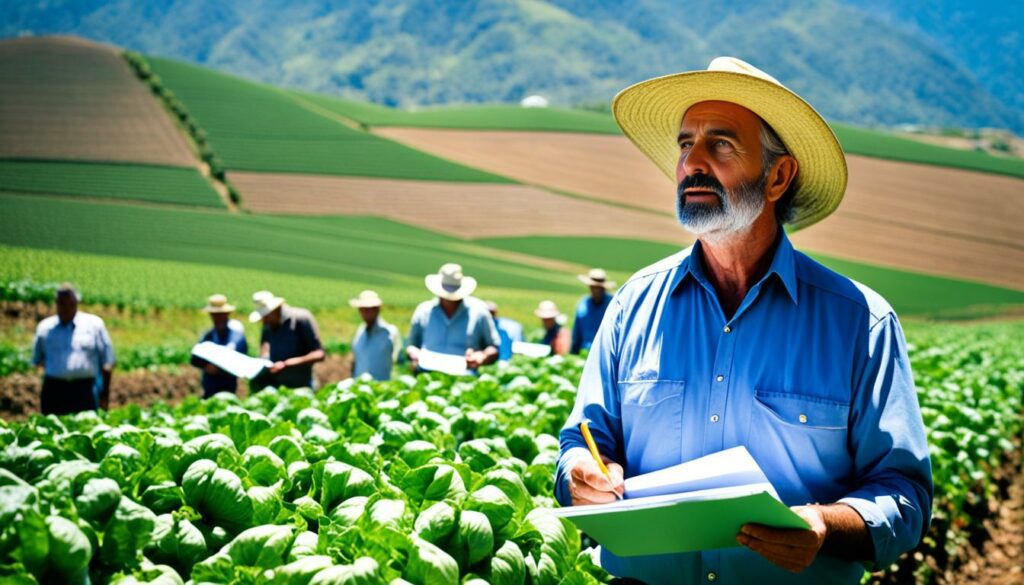
The government wants to make more food right here in the UK. This push has seen more farmers join up to help. Things like the Sustainable Farming Incentive and Countryside Stewardship have got a lot more popular. They’ve even seen a 10% increase in how much they’re valued.
For doing things good for the environment, farmers can get up to £1,242 for each hectare. This shows just how important helping nature is. In 2023, about 8,000 farmers have said they want to be part of the Sustainable Farming Incentive.
Keeping the UK fed for years to come means being smart about farming. The government is making sure farming helps the environment. They’re rewarding farmers for more than 50 new tasks, including farming next to forests.
In 2023, over £168 million was given for new ideas in farming, keeping animals healthy, and protecting the planet. There’s another £45 million for machines and research to help farmers more. This all shows how the UK is working hard to have a strong farming future.
The industry’s view on Brexit farming strategies varies. The National Farmers Union (NFU) has shared its thoughts on the new Brexit farming support programmes. They see both good and bad in these policies.
The NFU supports some parts of the new support schemes. They like the focus on environmental land management and money going into UK farming. Yet, they worry a lot too. The cuts in subsidies are causing financial problems. In 2022, farming incomes from subsidies dropped by 20 to 40 percent. And, it’s expected to drop even more by 2024.
| Year | Subsidy Reduction |
|---|---|
| 2022 | 20-40% |
| 2023 | Expected – 50-70% |
Trade deals are a big worry for Brexit farming. The NFU warns of dangers from agreements with places like Australia and New Zealand. They fear too much competition. Cheaper imports could mean UK farmers earn less.
But, there’s hope too in reaching the Asia-Pacific markets. Although more competition is a risk, it could also mean selling more UK farm products. Finding the right balance is key. The UK needs to look at both the risks and possible gains for its farmers.
The UK government must address these concerns carefully. Making sure UK farmers can still do well is very important for the future of British agriculture.
The UK’s farming scene is changing a lot after Brexit. The government is helping farmers adapt to this new world. It’s tough because the EU gives more money to its farmers. But UK farmers can now try new things.
The change is hard on UK food exports to the EU. Things are getting more challenging. The government is spending less on farming, taking inflation into account. Each part of the UK is doing things its own way since Brexit.
In England, there’s a new plan that offers small benefits with lots of rules. Yet, Scotland keeps direct payments, focusing more on the environment. Wales is not keen on a general support plan. But, Northern Ireland puts more focus on producing food. It follows some EU laws more closely with a flexible approach.
The Brexit impact is different in each UK country. England and Wales are moving away from the EU more than Scotland and Northern Ireland. But, they all want to support farmers and protect nature. They aim for a mix of old and new policies.
This mix includes spending on new tech, keeping the land healthy, and helping young farmers. These steps will make UK farming stronger. They address concerns and plan for a bright future. To learn more, see our in-depth report on UK farming changes after Brexit.
Prime Minister Rishi Sunak introduced the Brexit farming support programs at the Farm to Fork Summit. They aim to make UK farming stronger. This will happen by growing more food at home, using new tech, and teaching future farmers.
The support package aims to cut down on using energy and water. It also wants to make it easier to invest in gardening, build glasshouses faster, and check food safety better.
The UK Food Security Index checks how safe our food is. It looks at issues like worldwide problems and climate change.
After Brexit, the government’s plan is to grow more food here and use our land well. They’re looking at security trends, fixing supply problems, and investing in farm tech.
The government is funding new high-tech in farming, such as robots. They’re doubling the money for garden businesses and improving how we farm by using machines for weeding.
The government’s helping young people get into farming by offering jobs and good training. They want these future farmers to know the latest farming and business skills.
The government’s working to cut the time it takes to get farm rules approved. This includes making it easier to build greenhouses, to help farms produce more and better food.
Farmers hit by floods will get more aid. This means more money from the Farming Recovery Fund and help from IDBs. They’ve been given £75 million to help them after the winter storms.
After Brexit, new farm aid will focus on protecting nature while keeping farms productive. It offers bonuses for being eco-friendly. This is different from the EU’s old way of helping farmers.
The Brexit farm aid helps everyone in farming, from those using new tech to those just starting out. It makes farming simpler and better for the UK.
Big money is being put into making crops better and stronger. This work helps crops fight off bad things and cuts the cost for farmers.
The government is making sure farmers get a fair deal when selling fruit, veg, and eggs. They’re putting someone in charge to check on this, making sure things are fair all through the food line.
These schemes want farmland to be used well and to look after nature. They’re part of a big plan to get most of the natural spaces in the UK back by the end of the decade.
The government wants more food grown here and eaten here, to keep our food safe in the long run. They care about the land and growing food the right way.
The National Farmers Union has mixed feelings about the support. They like some parts but worry about new trade deals hurting local farmers. Yet, they hope to sell more food to Asia in the future.